The African Mining Legislation Atlas (AMLA) is a legislation gathering organization, dissemination and capacity building project with three main activities:
 Creation of the AMLA platform, a free online one-stop resource for Africa's mining legal framework (mining codes, regulations and related legislation) with interactive features to provide comparative data
Creation of the AMLA platform, a free online one-stop resource for Africa's mining legal framework (mining codes, regulations and related legislation) with interactive features to provide comparative data Production of the AMLA guiding template, an annotated document that outlines a menu of legislative solutions to assist countries in the preparation or revision of their mining laws
Production of the AMLA guiding template, an annotated document that outlines a menu of legislative solutions to assist countries in the preparation or revision of their mining laws Capacity building through training (on-ground and remotely) of African legal professionals a) in the use of the platform and b) on overall issues in mining law
Capacity building through training (on-ground and remotely) of African legal professionals a) in the use of the platform and b) on overall issues in mining law
The project objective is to support African countries in maximizing mineral resource benefits through:
- Promoting transparency, accessibility and comparison of Africa’s mining laws;
- Facilitating the preparation, revision and implementation of mining laws;
- Providing a living database that will catalyze research and policy debates on legal and regulatory issues;
- Promoting the development of local legal expertise on mining laws.
Initiated by the World Bank’s Legal Vice Presidency in 2013, the AMLA project is being implemented in partnership with the African Legal Support Facility of the African Development Bank and the African Union Commission, in coordination with several African Universities. At the beginning of 2017, the operational knowledge – relating to maintenance of the AMLA platform, as well as the coordination of the AMLA training program – was transferred from the World Bank to an AMLA Secretariat with a department dedicated to this aspect, within the ALSF. Furthermore, it was resolved that a Project Implementing Consortium (PIC) would be established and will be comprised of reputable international and regional institutions knowledgeable on sector specific issues. Overall steering, guidance and support will be provided by the Project Facilitation Committee (FC) which is composed of the ALSF, the African Union Commission (AUC) and the WBG.
FEBRRUARY 2025
AMLA Project Video at Mining Indaba 2025
Demetrios Papathanasiou extends his gratitude to all who participated in the AMLA project video, showcased at the 2025 Mining Indaba on February 5. Sponsored by AMLA’s key partner, the African Legal Support Facility, the event highlighted the importance of legal frameworks in Africa’s extractive sector. Watch as he acknowledges the contributors and the impact of AMLA’s work in shaping responsible mining governance.
Mining Sector Diagnostic (MSD)
The Mining Sector Diagnostic (MSD) is a diagnostic tool that is used to comprehensively assess a country’s mining sector. The tool analyzes primary data (the country’s documented laws, rules and regulations) and interview data (from in-country interviews with stakeholders from government, industry, and civil society) to clearly identify the mining sector’s relative strengths and weaknesses.
KNOWLEDGE GENERATION AND EXCHANGE
The exchange and development of information and knowledge platforms continue EGPS’s tradition of supporting the sharing and dissemination of best practices, research findings, and lessons learned. Existing platforms supported by EGPS, such as Delve and the Climate Minerals Explorer connect diverse stakeholders, including governments, NGOs, donors, and local communities, providing information, and fostering collaboration and networking. These platforms can also support capacity building through training modules, resource libraries, and expert networks. Furthermore, they play a crucial role in data collection and analysis, enabling real-time data sharing and effective monitoring and evaluation of development projects. Beyond knowledge sharing, information platforms influence policy, drive innovation, and enhance transparency and accountability. They provide forums for policy dialogue and advocacy, allowing stakeholders to discuss and shape development policies based on evidence and shared experiences.
Expected outcomes for EGPS-3 are:
- New market opportunities for the sustainable production of minerals needed for the clean energy transition
- Decarbonization leading to improved energy efficiency and low-carbon electricity to scale up zero-carbon power sources supply and substantial reduction of fossil fuels in mining operations.
- Domestic value created through development of diversified and inclusive supply chains of metals and minerals for clean energy products in targeted countries.
- Formalization and professionalization of ASM resulting in increased revenues for artisanal and small-scale miners.






